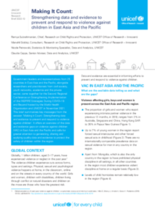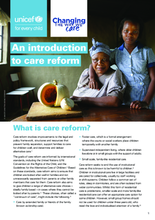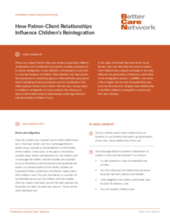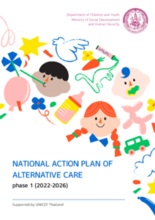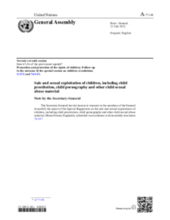Displaying 151 - 160 of 1025
The Eastern and Southern Africa Regional Learning Platform hosted a webinar on September 20, 2022, with panel of experts who explored how the social service workforce can be strengthened to support care reform in Eastern and Southern Africa.
The video provides key lessons learnt from COVID-19 on care reform from interviews with UNICEF, government and NGO staff in Rwanda, Uganda, Malawi and Kenya.
This brief provides an overview of the data and evidence gaps on violence against children in East Asia and the Pacific. It calls for greater attention to generating, sharing and applying quality data and evidence to protect the safety and rights of children within the region.
Although care reform is well established in some parts of the Eastern and Southern Africa, many countries in the region are just beginning their care reform journey. This short paper is aimed at these contexts. It explains what care reform is, the different components of care reform, why care reform is important and how to start a care reform process.
This practical manual was designed for practitioners and service managers who want to build their knowledge and skills on meaningful participation.
In this video, Kinnected Myanmar Senior Social Worker, Htoo Say, describes the nature of patron-client relationships and gives examples of how they influence the participation of directors and families in the reintegration process. In addition, she shares critical insights into how the Kinnected Myanmar social workers learnt to navigate these relationships to facilitate children’s reintegration and promote their best interests.
Why is it so important to consider mental health and emotional well-being in child care and child protection? How can we address mental health needs in a non-clinical environment?
National Plan of Action on Alternative Care for Children Phase 1 (2022 - 2026) has been prepared to provide the direction of alternative care operations in Thailand that reflects the spirit of practices on alternative care for children in 5 areas:
The objective of this webinar was to present the CPSS approach, and reflect on how this approach, and especially the seven intermediate outcomes of CPSS are relevant to the care reform agenda.
In the present report, the UN Special Rapporteur on the sale and sexual exploitation of children, including child prostitution, child pornography and other child sexual abuse material, describes the activities undertaken in relation to the discharge of her mandate since her previous report to the United Nations General Assembly. She also presents a thematic study on addressing the vulnerabilities of children to sale and sexual exploitation within the framework of the Sustainable Development Goals.

